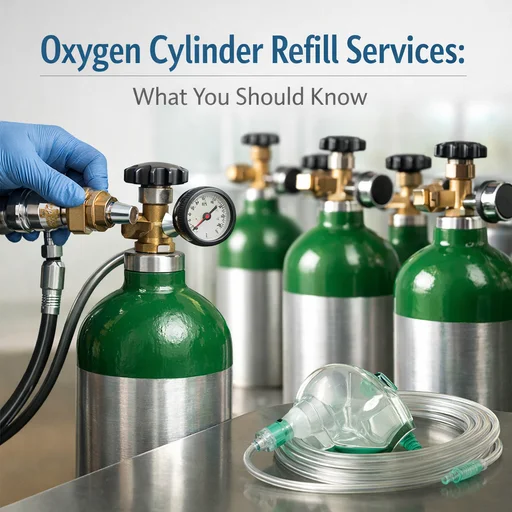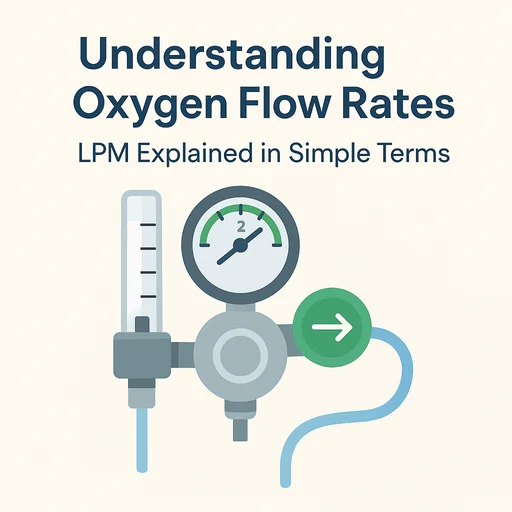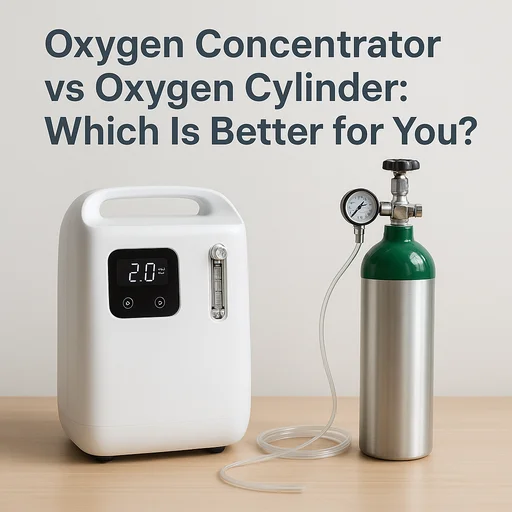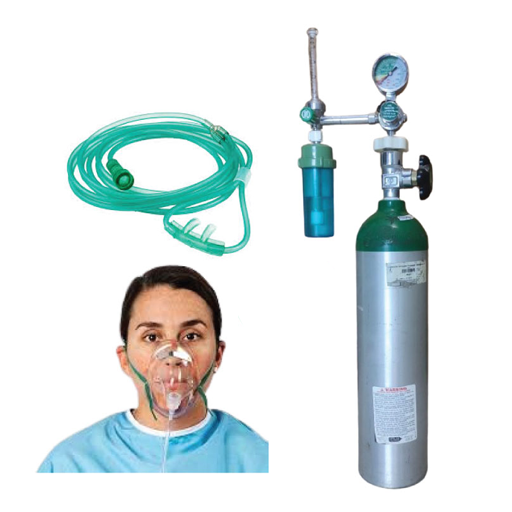Picture this: You’re in the middle of a severe asthma attack. Your chest tightens. Every breath feels like pulling air through a straw. Your inhaler isn’t helping. What you need right now is oxygen, and fast.
Asthma causes around 1,600 deaths in the United Kingdom every year, with progressive hypoxemia being a key contributor. The reality is stark. When airways constrict and inflammation kicks in, your body’s ability to absorb oxygen can drop to dangerous levels. Medical oxygen isn’t just helpful in these moments. It can be lifesaving.
Understanding What Happens During an Asthma Attack
When asthma strikes, your airways don’t just narrow. They become inflamed, produce excess mucus, and make it incredibly difficult for air to reach your lungs. During an asthma attack, the airways that allow passage of air in and out of the lungs usually constrict, and you may find it hard to breathe.
Here’s what makes it so dangerous. Your body needs oxygen for everything. Your brain needs it. Your heart needs it. Every cell in your body depends on it. Oxygen is central to life processes, with most of the biochemical and metabolic activities in our bodies needing this ingredient. When an asthma attack cuts off that supply, your body goes into crisis mode.
Most mild to moderate attacks don’t affect oxygen levels too severely. Your lungs have a clever way of managing. Your lungs have a neat ability to maintain normal oxygen levels even while this is happening, with an uncanny ability to constrict blood vessels leading to poorly ventilated regions of your lungs. But when attacks become severe, this system breaks down.
When Oxygen Levels Drop: Understanding the Danger Zone
Medical professionals consider low oxygen levels to be in the region of 65 mm Hg, which corresponds to an oxygen saturation level of 92% in both adults and children. This is the critical threshold. Once your oxygen saturation drops below 92%, you’re in dangerous territory.
An asthma attack with a saturation of less than 92 percent is considered a severe asthma attack, and the number one cause of death due to asthma is hypoxia. That’s why emergency rooms monitor oxygen levels so closely for anyone coming in with breathing problems.
The symptoms of low oxygen levels can include confusion, extreme fatigue, shortness of breath even at rest, headaches, and a bluish tint to your lips or fingertips. If you notice any of these signs, you need medical help immediately.
Why Medical Oxygen Is the First Line of Defense
Oxygen should be the first treatment given to any patient with acute severe asthma. Not after medications. Not while waiting to see if an inhaler works. Right away.
The reason is simple: By delivering a steady stream of supplemental oxygen, often at 2 to 4 liters per minute or higher through a concentrator, it bypasses struggling lungs to flood your bloodstream with the oxygen your body desperately needs. This buys time for other medications to work while keeping your vital organs functioning.
When a person has an asthma attack, the muscles surrounding their bronchial tubes constrict, and if a person’s bronchial tubes narrow, they will find it extremely hard to breathe and be unable to take in enough oxygen. Medical oxygen compensates for this by increasing the concentration of oxygen available, even through narrowed airways.
How Oxygen Therapy Works for Asthma Patients
Oxygen therapy isn’t complicated, but it is precise. Oxygen therapy is administered via a nasal cannula or mask, stabilizing oxygen saturation to 92 to 96%, per medical guidelines. The goal isn’t to pump you full of oxygen. It’s to restore your levels to a safe, normal range.
There’s an important balance here. Too little oxygen is dangerous, but so is too much. Research from the British Thoracic Society notes that people with acute severe asthma who received 100% oxygen experienced high levels of carbon dioxide in their blood. That’s why doctors carefully control the flow rate and concentration.
Modern oxygen therapy uses several delivery methods. High-flow nasal cannula provides high-flow gas at the rate of 8 to 80 liters per minute through the air-oxygen mixing device, and the oxygen concentration can be set to 21% to 100% according to the patient’s needs. This newer method has shown particular promise for severe cases.
Different Situations Call for Different Oxygen Needs
Not every person with asthma needs oxygen therapy the same way. Some people only need it during acute attacks. Some customers grab a portable unit for occasional use, while others rely on home units for round-the-clock support.
For emergency situations, oxygen therapy is typically short-term. Oxygen therapy may be given as a short-term emergency treatment to someone who is experiencing a COPD flare-up or recovering from an illness. You get oxygen in the emergency room or ambulance, your attack is brought under control, and you go home.
But for people with severe, persistent asthma that keeps oxygen levels chronically low, longer-term solutions might be necessary. This could mean having an oxygen concentrator at home or access to portable cylinders for when you need them.
The Equipment That Delivers Life-Saving Oxygen
The equipment matters. Oxygen therapy can be provided either by an electrically-operated machine called an oxygen concentrator that filters oxygen from the air in your home, or by a cylinder containing oxygen.
Oxygen concentrators pull oxygen from the surrounding air and deliver it at the concentration you need. They’re reliable for home use and don’t need refilling. Oxygen cylinders, on the other hand, contain compressed oxygen and need to be refilled or replaced. They’re portable and crucial for emergencies.
Refillable portable oxygen cylinders are readily available and can be used to drive nebulizers if they are fitted with high flow valves. This dual function makes them particularly valuable. You can use them for oxygen therapy and to power nebulizers that deliver medication directly to your lungs.
For asthma patients who need to monitor their oxygen levels, a pulse oximeter can be helpful. These small devices clip onto your finger and show your oxygen saturation in real time. However, pulse oximeters are not reliable enough for them to be used in isolation for decision making regarding appropriate care, and clinical findings such as peak flow and symptoms are considered together. Always use them as one tool among many, not as your only guide.
Safety Considerations You Need to Know
Oxygen therapy is generally safe, but it requires some precautions. Oxygen therapy can only be prescribed to non-smokers, as having oxygen in the house is a fire risk, and no one should smoke or vape near oxygen, or use oxygen near any type of naked flame. This includes gas stoves, fireplaces, and even candles.
If you take in more oxygen than your body needs, it can slow your breathing and heart rate to dangerous levels, and too much oxygen can lead to oxygen toxicity or oxygen poisoning. That’s why oxygen is a prescription medication. You need professional guidance on the right flow rate and duration.
Common side effects are usually mild. You might experience dryness in your nose or throat, or some skin irritation where the nasal cannula sits. These are manageable and far outweighed by the benefits when you genuinely need oxygen therapy.
When You Should Seek Oxygen Support
You should seek immediate medical attention if you experience severe shortness of breath that doesn’t respond to your usual medications, confusion, changes in skin color ranging from blue to cherry red, or if you’re coughing to clear your lungs which uses even more oxygen and can make symptoms worse.
If you’ve had previous severe attacks that required hospitalization or intubation, you’re at higher risk for future emergencies. Patients with even a single episode requiring intubation for severe asthma are at very high risk of recurring life threatening attacks and death. In these cases, having emergency oxygen available at home might be recommended by your doctor.
For those who live in areas with limited immediate access to emergency services, having oxygen cylinders readily available can make the difference between a manageable situation and a life-threatening emergency.
The Role of Supportive Equipment
Beyond oxygen itself, having the right supportive equipment matters. Nebulizer machines can deliver bronchodilator medications in mist form, often more effectively than standard inhalers during severe attacks. When used with oxygen, they provide both medication and supplemental oxygen simultaneously.
For patients with overlapping conditions like sleep apnea, which affects some people with asthma, CPAP machines can help maintain open airways during sleep. Nocturnal oxygen saturation is decreased in severe asthma, and OSA severity correlates to oximetric parameters.
Making Oxygen Therapy Accessible
Access to medical oxygen should never be a barrier when someone needs it. That’s why having reliable suppliers who understand the urgency matters. When an asthma attack happens in the middle of the night, you need a provider who answers the phone. When your oxygen cylinder runs low, you need fast refills.
Quality equipment, proper installation support, and ongoing maintenance aren’t luxuries. They’re necessities. Your oxygen delivery system needs to work perfectly every time because lives depend on it.
Taking Control of Your Asthma Management
The best way to prevent hypoxia is to keep your asthma under control every day by sticking with your asthma treatment plan and taking medicine to help prevent flares. Prevention is always better than crisis management.
Know your triggers and avoid them when possible. Keep your rescue inhaler accessible. Monitor your symptoms and peak flow readings. Have an action plan that you and your family understand. And crucially, know when to escalate care and seek emergency help.
For people with severe asthma, this might also mean having emergency oxygen available at home. Talk to your doctor about whether this makes sense for your situation. Consider factors like how far you live from emergency services, how quickly your attacks tend to escalate, and your history of severe episodes.
The key point
Medical oxygen isn’t just another treatment option for asthma patients. In severe attacks, it’s the difference between maintaining organ function and facing potentially fatal consequences. Progressive hypoxemia is probably an important cause of death, and oxygen could save lives.
If you have asthma, especially if you’ve had severe attacks before, understand your oxygen therapy options. Know what equipment exists, how to access it quickly, and when you need to use it. Don’t wait until you’re in crisis to figure this out.
Your breathing is fundamental to everything else in your life. When it’s compromised, having immediate access to medical oxygen can mean everything. Take the time now to ensure you’re prepared for whatever your asthma might throw at you.













